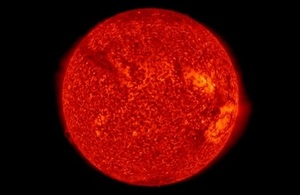Dstl reports on space weather
This week the Defence Science and Technology Laboratory (Dstl) will be celebrating World Space Week 2017 with space weather reports.

Every day this week, Dstl will be posting a ‘Space Weather Forecast’ on social media to increase awareness of how weather in space can impact us on Earth.
The Met Office Space Weather Operations Centre (MOSWOC) continuously monitors space weather in order to assess the risk to us on Earth. The Space Weather forecasters from the MOSWOC, in conjunction with scientists at Dstl, research the impact of space weather such as solar flares, coronal mass ejections (CMEs), geomagnetic storms and changes in our ionosphere.
Space weather describes disturbances in Earth’s upper atmosphere and magnetic field which have a variety of impacts on mankind and our technology.
The major impacts of a severe space weather event can be divided into 2 areas: impacts on technology on Earth; and threats to equipment and health in space and at high altitude.
These could potentially include:
- Power grid outages
- Disruption to Global Navigation Satellite Systems (GNSS) / Global Positioning Satellites (GPS)
- High Frequency (HF) radio communications outages
- Satellite damage
- Increased radiation levels at high altitude
Thankfully, severe space weather events are rare but when they do occur the impacts to our national infrastructure are extremely significant.
Space weather events have always occurred, but our modern reliance on technology driven systems makes us more susceptible to the impacts.
Different systems are exposed to varying levels of risk depending on technical design, location and the type of space weather that can affect them. The challenge for scientists is to ensure new systems are designed with appropriate engineering solutions to minimize the risk posed by space weather.
Dstl Space Weather specialists have stated that:
Monitoring space weather is fundamental to ensuring that our defence systems and national infrastructure remain secure. Part of the work we undertake is to collaborate with international scientists and the Met Office to ensure that we assess and learn from space weather and the impact it may have on the Earth.
This week at Dstl, we will be sending out weather reports supplied by the Met Office to raise awareness and also to encourage young people to get interested in this area of work.
Space Weather Programme Manager at the Met Office, Catherine Burnett, said:
The services we deliver today, together with our plans for future products and services, are underpinned by an in-house science team who work with many partners across government and academia, including colleagues at Dstl. This way we ensure the very best scientific understanding is used to help the UK prepare for and mitigate against the potential impacts of space weather.
Check out @dstlmod for twitter updates on Space Weather, with thanks to the Met Office for the information.
Dstl media enquiries
Email DstlPress@dstl.gov.uk
Press office 01980 950000 option 2